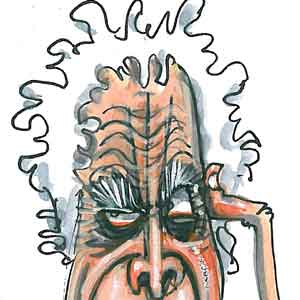My clever, sensitive, radio producer is unhappy. "What's going to happen to our little chats outside Broadcasting House if you've stopped smoking?" "Don't worry", I tell her, "I'll still come down and stand beside you. I'll say exactly the same things. It's just that I won't be smoking while I'm saying them." "It won't be the same. And why on earth did you give up in the first place? You never gave anyone any warning." She's right. I do feel that I've somehow betrayed her and the other friends who rely upon me as an older man to confirm the validity of their own heavy smoking by banging through at least twenty Camel Lights on an average night out in the George.
But how could I have given any advance notice when the reason for my decision to quit was so unpredictable, so serendipitous. It began with the packets. For a couple of years now I've trotted down to Soho every fortnight to pick up cheap ciggies from an air hostess who regularly brings back cartons from France. Until now the health warnings on French Camels have been relatively discreet: a few words squashed down the bottom about how smoking is "nuit gravement à la santé". But four weeks ago all that changed. Every one of the forty packets I bought from her now declared in huge black lettering, Fumer tue. If it was in English I might have eventually learned to ignore it in the way that I've learned to ignore so much other written material about the perils of smoking. But because it's in French I find that I have to translate it. I can't stop myself. Over and over again. Fumer tue. Smoking kills.
Fumer tue. Smoking kills.
And then came the appalling bookshop incident. I knew when I stood up to say a few words at the launch of Jim Herrick's fine new book Humanism: An Introduction that I was underrehearsed. I'd rather cavalierly imagined that I could get through my allotted five minutes by simply saying something about it being an honour to be associated with a leading intellectual humanist (nod in Jim's direction) and then going straight into a short rousing trope (one hand raised, fist lightly clenched) about the relevance of humanism in an age that was increasingly fatalistic about the possibility of human progress.
It started well, but halfway through I suddenly realised that my argument had become trapped in a time warp. "We live in an age in which there is a suspicion of all rational endeavour", I announced portentously. "Our understandable wariness about utopian social planning has engendered a cynicism about any sort of planning. Quite frankly, we live in an age in which there is a suspicion of all rational endeavour."
There was only one way out. "Hey, listen", I said, with a wry selfdeprecatory shake of the head, "You don't want to hear a superannuated sociologist propounding halfbaked theories. That's not what we're here for. We're here to celebrate Jim Herrick's new book. So, that's quite enough from me. Please raise your glasses. The toast is Jim."
After a fiasco like that there was only one thing to do. Put my head down, butt through the crowd, get outside onto the pavement, and light a cigarette. Aah, that's better. Within seconds, though, I was joined by a former member of my audience. "Didn't know you smoked", he said, allowing his short beard a brief censorious waggle. "Tell me something. How can one call oneself a rationalist and still be a smoker? I mean, how can you talk about the value of planning other people's lives when you can't take control of your own? Look here" and he tapped the bottom third of my cigarette packet "Can't you even read French?"
I stopped smoking the next day. All good rationalists should recognise the moment when the Fates turn unequivocally against them.

